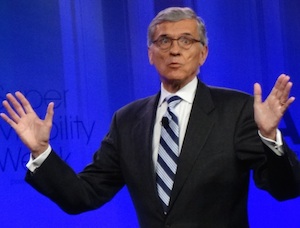U.S. senate looks at conduit requirements for federal highway projects
![By MPD01605 (talk · contribs) (Own work) [Public domain], via Wikimedia Commons](https://www.tellusventure.com/images/2016/2/highway_signs.jpg)
The “Mobile Now” bill that was introduced in the U.S. senate is mostly about freeing up more government-reserved spectrum for broadband purposes, but it also includes an endorsement, if not a full-on commitment, to a dig once policy. It expresses a desire for federal transportation officials to include conduit in highway projects…
… MoreIt is the sense of Congress that Federal agencies should endeavor to create policy that–
- evaluates and provides for the inclusion of broadband conduit installation in federally funded highway construction projects;
- provides for such inclusion without negatively impacting the safety, operations, and maintenance of the highway facility, its users, or others;
- promotes investment and competition by ensuring that communications providers may access such conduit on a nondiscriminatory basis; and
- limits any burden on State departments of transportation incurred by the inclusion of broadband conduit in such projects.

![By Billy Hathorn (Own work) [CC BY 3.0 (https://creativecommons.org/licenses/by/3.0)], via Wikimedia Commons](https://www.tellusventure.com/images/2016/2/fbi_building.jpg)
![By H. W. Houck [Public domain], via Wikimedia Commons](https://www.tellusventure.com/images/2016/2/armstrong_radio.jpg)
![By Ltljltlj [Public domain], via Wikimedia Commons](https://www.tellusventure.com/images/2016/2/san_benito_county_g1.jpg)




![By brewbooks from near Seattle, USA (Shoveling manure) [CC BY-SA 2.0 (https://creativecommons.org/licenses/by-sa/2.0)], via Wikimedia Commons](https://www.tellusventure.com/images/2016/2/shovelling_manure.jpg)